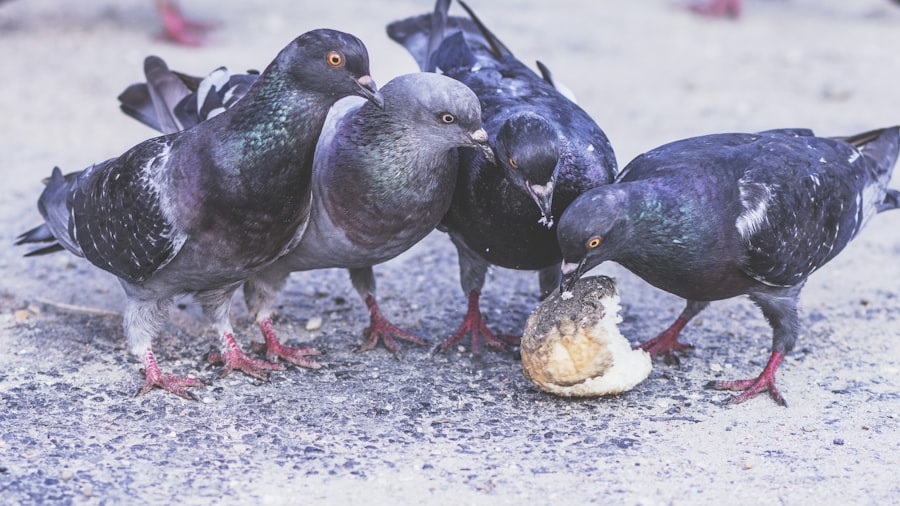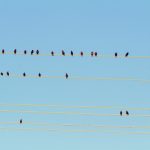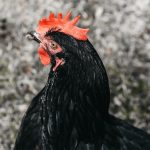Pigeons pose several risks to chickens and their environment. These birds can carry and transmit diseases such as salmonella, E. coli, and avian influenza, which are harmful to both chickens and humans.
Pigeons may also introduce parasites like mites, lice, and ticks to chicken coops, negatively impacting the health and well-being of the chickens. Additionally, pigeons often consume and contaminate chicken feed, potentially leading to food shortages and unsanitary conditions within the coop. The presence of pigeons can cause stress and anxiety in chickens, affecting their egg production and overall health.
Understanding these risks is essential for implementing effective strategies to keep pigeons away from chicken coops and maintain the health of the flock.
Table of Contents
- 1 Creating Physical Barriers to Keep Pigeons Away
- 2 Implementing Visual Deterrents to Scare Pigeons
- 3 Using Sound-Based Deterrents to Repel Pigeons
- 4 Removing Food and Water Sources that Attract Pigeons
- 5 Encouraging Natural Predators to Keep Pigeon Population in Check
- 6 Regularly Cleaning and Maintaining the Chicken Coop to Prevent Pigeon Infestations
- 7 FAQs
Key Takeaways
- Pigeons can pose health risks to chickens by spreading diseases and parasites
- Physical barriers such as netting or wire mesh can prevent pigeons from accessing chicken coops
- Visual deterrents like scarecrows or reflective tape can help keep pigeons away from chicken coops
- Sound-based deterrents such as ultrasonic devices can be effective in repelling pigeons
- Removing food and water sources around the chicken coop can discourage pigeons from lingering in the area
Creating Physical Barriers to Keep Pigeons Away
Physical Barriers: A Simple yet Effective Solution
One effective way to keep pigeons away from the chicken coop is by creating physical barriers that prevent them from accessing the area. This can be achieved by installing wire mesh or netting around the coop to block off entry points for pigeons. Additionally, sealing off any gaps or openings in the coop’s structure can help prevent pigeons from roosting or nesting in the area.
Scare Wires and Spikes: A Deterrent for Pigeons
Another physical barrier that can be implemented is the use of scare wires or spikes on ledges and surfaces where pigeons tend to perch. These deterrents make it uncomfortable for pigeons to land and discourage them from staying in the vicinity of the chicken coop.
Sealing Off Entry Points and Gaps
Creating physical barriers is an effective method to keep pigeons away from the chicken coop. This can be achieved by installing wire mesh or netting around the coop to block off entry points for pigeons. Additionally, sealing off any gaps or openings in the coop’s structure can help prevent pigeons from roosting or nesting in the area.
Implementing Visual Deterrents to Scare Pigeons

Visual deterrents can be an effective way to scare pigeons away from the chicken coop. One method is to use reflective surfaces such as mirrors or shiny objects that create a glare and disorient pigeons, making them uncomfortable and deterring them from staying in the area. Another visual deterrent is the use of predator decoys such as fake owls or hawks, which create the illusion of a threat and discourage pigeons from roosting near the coop.
Additionally, hanging scare tape or balloons with intimidating eyes or patterns can also startle pigeons and prevent them from settling in the vicinity of the chicken coop. Implementing visual deterrents is an effective way to scare pigeons away from the chicken coop. One method is to use reflective surfaces such as mirrors or shiny objects that create a glare and disorient pigeons, making them uncomfortable and deterring them from staying in the area.
Another visual deterrent is the use of predator decoys such as fake owls or hawks, which create the illusion of a threat and discourage pigeons from roosting near the coop. Additionally, hanging scare tape or balloons with intimidating eyes or patterns can also startle pigeons and prevent them from settling in the vicinity of the chicken coop.
Using Sound-Based Deterrents to Repel Pigeons
Sound-based deterrents can be an effective way to repel pigeons from the chicken coop. One method is to use ultrasonic devices that emit high-frequency sounds that are unpleasant for pigeons but harmless to chickens and other animals. These devices can be strategically placed around the coop to create a hostile environment for pigeons and discourage them from staying in the area.
Another sound-based deterrent is the use of distress calls or predator noises that mimic natural threats to pigeons, causing them to feel unsafe and avoid roosting near the chicken coop. Using sound-based deterrents is an effective way to repel pigeons from the chicken coop. One method is to use ultrasonic devices that emit high-frequency sounds that are unpleasant for pigeons but harmless to chickens and other animals.
These devices can be strategically placed around the coop to create a hostile environment for pigeons and discourage them from staying in the area. Another sound-based deterrent is the use of distress calls or predator noises that mimic natural threats to pigeons, causing them to feel unsafe and avoid roosting near the chicken coop.
Removing Food and Water Sources that Attract Pigeons
Removing food and water sources that attract pigeons is essential in keeping them away from the chicken coop. This can be achieved by securing chicken feed in tightly sealed containers that are inaccessible to pigeons. Additionally, cleaning up spilled feed promptly and removing any standing water sources can help deter pigeons from lingering around the coop.
It’s also important to minimize food waste and maintain a clean environment within and around the chicken coop to reduce the attractiveness of the area to pigeons. Removing food and water sources that attract pigeons is essential in keeping them away from the chicken coop. This can be achieved by securing chicken feed in tightly sealed containers that are inaccessible to pigeons.
Additionally, cleaning up spilled feed promptly and removing any standing water sources can help deter pigeons from lingering around the coop. It’s also important to minimize food waste and maintain a clean environment within and around the chicken coop to reduce the attractiveness of the area to pigeons.
Encouraging Natural Predators to Keep Pigeon Population in Check

Attracting Natural Predators
Providing perches or nesting boxes for predators such as hawks, owls, or falcons can attract them to the area and create a natural deterrent for pigeons.
Maintaining a Diverse Habitat
Maintaining a habitat that supports a diverse range of wildlife can encourage natural predators to frequent the vicinity of the chicken coop, helping to control the pigeon population without harming the chickens.
Benefits of Natural Predators
By encouraging natural predators, you can keep the pigeon population in check around the chicken coop without harming the chickens. This approach is a safe and effective way to manage pigeon populations.
Regularly Cleaning and Maintaining the Chicken Coop to Prevent Pigeon Infestations
Regularly cleaning and maintaining the chicken coop is crucial in preventing pigeon infestations. This includes removing droppings, spilled feed, and debris that can attract pigeons and create unsanitary conditions within the coop. Additionally, repairing any structural damage or openings that may provide access points for pigeons can help prevent infestations.
Keeping the coop well-ventilated and dry can also discourage pigeons from roosting in the area. Regularly cleaning and maintaining the chicken coop is crucial in preventing pigeon infestations. This includes removing droppings, spilled feed, and debris that can attract pigeons and create unsanitary conditions within the coop.
Additionally, repairing any structural damage or openings that may provide access points for pigeons can help prevent infestations. Keeping the coop well-ventilated and dry can also discourage pigeons from roosting in the area. In conclusion, understanding the risks posed by pigeons around chickens is essential in implementing effective strategies to keep them away from the coop.
Creating physical barriers, implementing visual and sound-based deterrents, removing food and water sources that attract pigeons, encouraging natural predators, and regularly cleaning and maintaining the chicken coop are all important steps in preventing pigeon infestations and ensuring a healthy environment for chickens. By employing a combination of these methods, poultry owners can effectively manage pigeon populations and protect their chickens from potential harm.
If you’re looking for ways to keep pigeons away from your chickens, you may also be interested in learning about the best kind of coop for chickens. Check out this article for tips on creating a secure and comfortable environment for your feathered friends.
FAQs
What are the potential risks of having pigeons around chickens?
Pigeons can carry diseases such as avian influenza, salmonella, and E. coli, which can be transmitted to chickens. Additionally, pigeons can compete with chickens for food and water, and their droppings can contaminate the chicken coop.
How can I keep pigeons away from my chickens?
There are several methods to keep pigeons away from chickens, including using physical barriers such as netting or wire mesh, installing scare devices such as reflective tape or predator decoys, and keeping the chicken coop clean and free of food sources that may attract pigeons.
Are there any natural deterrents to keep pigeons away from chickens?
Some natural deterrents to keep pigeons away from chickens include planting aromatic herbs and flowers around the chicken coop, using essential oils with strong scents such as peppermint or eucalyptus, and introducing natural predators such as hawks or owls in the area.
Can pigeons pose a threat to the health of chickens?
Yes, pigeons can pose a threat to the health of chickens as they can carry and transmit diseases such as avian influenza, salmonella, and E. coli. Additionally, their droppings can contaminate the chicken coop and food sources, leading to potential health issues for the chickens.
Meet Walter, the feathered-friend fanatic of Florida! Nestled in the sunshine state, Walter struts through life with his feathered companions, clucking his way to happiness. With a coop that’s fancier than a five-star hotel, he’s the Don Juan of the chicken world. When he’s not teaching his hens to do the cha-cha, you’ll find him in a heated debate with his prized rooster, Sir Clucks-a-Lot. Walter’s poultry passion is no yolk; he’s the sunny-side-up guy you never knew you needed in your flock of friends!







